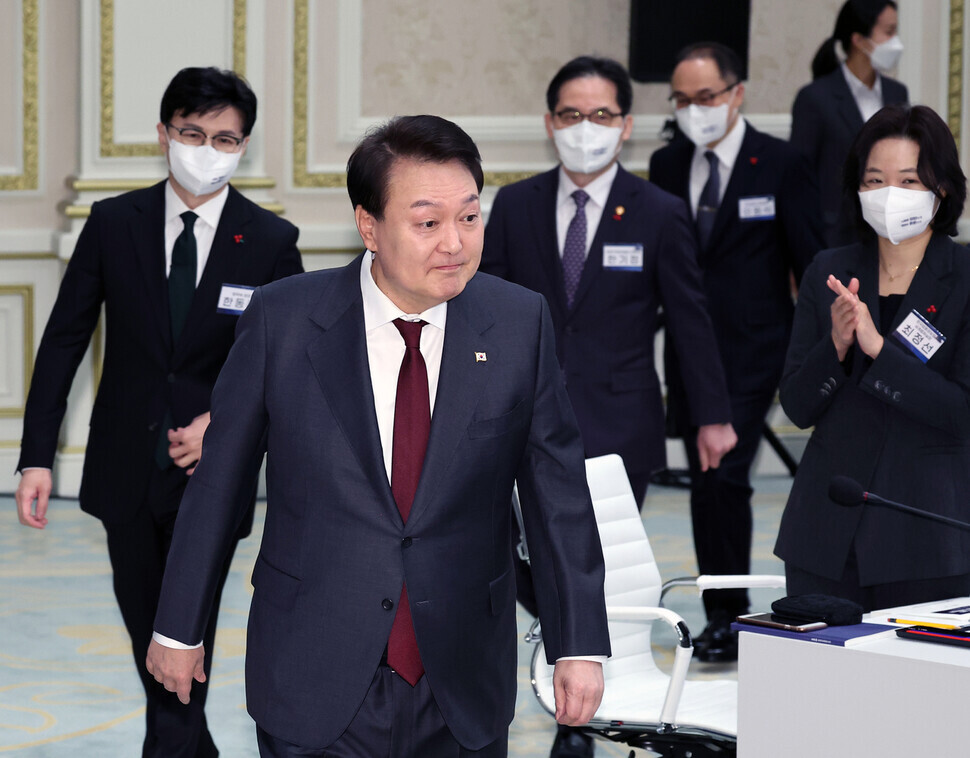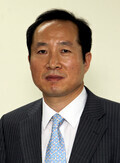hankyoreh
Links to other country sites 다른 나라 사이트 링크
[Column] Yoon Suk-yeol: A president hoping to become a king?


Helen Thomas, a reporter with the US-based United Press International news agency who passed away 10 years ago, was known during her lifetime as a “legend of the White House press corps.”
In 1960, she began what would become a 50-year career of covering the White House, all the way from the John F. Kennedy presidency to that of Barack Obama. She was also famous for asking pointed questions over those decades that put presidents on the spot.
In an interview with one magazine, Thomas stressed that reporters like her were the only institution in their society capable of regularly posing questions to presidents and holding them accountable. Otherwise, she warned, the presidents might end up like “kings.”
Her warning was that when a president is not subject to controls, they could transform into figures of untrammeled power.
I bring this up because it has major implications for South Korea as well. A look at the recent actions of President Yoon Suk-yeol raises fears that he is well on his way to becoming that kind of runaway figure of absolute power.
Yoon appears to not want to be checked by the press or by anyone, for that matter. He also seems unconcerned with any attempt to hold him back. Nine months into his presidency, he has yet to even meet with the top opposition party’s parliamentary leaders, let alone the party leader himself.
It’s the first time we’ve experienced a president like this. The practice among past presidencies returning from overseas visits has been to invite party leaders on both sides to explain the outcome. Those meetings have also been occasions for discussing important political issues.
But when Yoon returned from his latest overseas tour, he invited only the ruling party leadership to his presidential residence. His farfetched rationale for not meeting the opposition party leader was that he was a “suspect.”
Investigations and politics need to be separate matters. The very fact that Yoon will not meet with the top opposition party can be seen as proof that he regards investigations and politics as one and the same.
Recognizing the other party is a basic principle of representative democracy that Yoon rejects. Disturbingly, Yoon is refusing to engage with the majority party in the National Assembly even though cooperative governance is essential for rescuing the working class, which is being ground down by rising interest rates and soaring heating bills.
Yoon has also been keeping his distance from the press since mid-November of last year. That’s probably because he doesn’t want to field uncomfortable questions from reporters. Those are definite indications that Korea’s politics are backward.
Democracy depends upon checks and balances. The trouble begins when any single person is given free rein, especially when that person has basically zero experience with politics.
At the beginning of the year, Yoon needlessly stirred up a diplomatic contretemps with a gaffe calling Iran the “enemy” of the United Arab Emirates. He’s also been sowing anxiety among the public by ordering a strategy of retaliating “a hundredfold or a thousandfold” against a North Korean attack.
A plan to expand tax credits for chipmakers barely passed the National Assembly through a bilateral agreement based on the government’s plan, but then the Ministry of Economy and Finance said it would increase the tax credits in a reversal prompted by a single word from the president.
Amid straitened financial circumstances, there are an increasing number of issues that urgently require government support, including heating bills, but support for Korea’s chaebol conglomerates seems to be the only area where Yoon isn’t stingy.
It makes you wonder whether any of the president’s advisors or Cabinet members are brave enough to say no to the president’s blunders and misjudgments.
In today’s party politics, a president’s party is supposed to take the lead in checking and correcting errors in governance, but seeing how the ruling party’s leader was elected, we probably shouldn’t expect much in that regard.
In his book “Political Order and Political Decay,” Stanford University professor Francis Fukuyama, a famed scholar of international affairs, outlined three criteria for a democratic political system: the state, the rule of law, and democratic accountability.
Fukuyama distinguished patrimonial states, which are ruled through private networks of friends and family and captured by powerful elites, from modern states, which are governed by talented individuals who are appointed to key positions and roles because of their abilities.
According to Fukuyama, the rule of law is nonfunctional when the leader stands above the law, even when the law applies equally to all other citizens. Democratic accountability refers to a system in which the government is held accountable for serving the interests of society as a whole, with the legislature playing a key role.
The wondrous thing about contemporary liberal democracy, Fukuyama said, is that it’s only possible under a political system in which the immense authority of the state is constrained by law and parliament and in which that authority is executed through consensus. He warned that, without any checks, a powerful state becomes a dictatorship.
If we judge Yoon’s rule by those three standards, what conclusion would we come to? Considering that Yoon has appointed allies in the prosecution service and high school friends to key government positions, that the prosecutors have declined to question first lady Kim Keon-hee on allegations of stock manipulation, and that Yoon refuses to recognize the main opposition party as a partner for governance, Korean democracy is clearly in a precarious position.
Please direct questions or comments to [english@hani.co.kr]

Editorial・opinion
![[Editorial] Intensifying US-China rivalry means Seoul must address uncertainty with Beijing sooner than later [Editorial] Intensifying US-China rivalry means Seoul must address uncertainty with Beijing sooner than later](https://flexible.img.hani.co.kr/flexible/normal/500/300/imgdb/original/2024/0517/8117159322045222.jpg) [Editorial] Intensifying US-China rivalry means Seoul must address uncertainty with Beijing sooner than later
[Editorial] Intensifying US-China rivalry means Seoul must address uncertainty with Beijing sooner than later![[Column] When ‘fairness’ means hate and violence [Column] When ‘fairness’ means hate and violence](https://flexible.img.hani.co.kr/flexible/normal/500/300/imgdb/original/2024/0516/7417158465908824.jpg) [Column] When ‘fairness’ means hate and violence
[Column] When ‘fairness’ means hate and violence- [Editorial] Yoon must stop abusing authority to shield himself from investigation
- [Column] US troop withdrawal from Korea could be the Acheson Line all over
- [Column] How to win back readers who’ve turned to YouTube for news
- [Column] Welcome to the president’s pity party
- [Editorial] Korea must respond firmly to Japan’s attempt to usurp Line
- [Editorial] Transfers of prosecutors investigating Korea’s first lady send chilling message
- [Column] Will Seoul’s ties with Moscow really recover on their own?
- [Column] Samsung’s ‘lost decade’ and Lee Jae-yong’s mismatched chopsticks
Most viewed articles
- 1For new generation of Chinese artists, discontent is disobedience
- 2[Editorial] Transfers of prosecutors investigating Korea’s first lady send chilling message
- 3S. Korea “monitoring developments” after report of secret Chinese police station in Seoul
- 4Xi, Putin ‘oppose acts of military intimidation’ against N. Korea by US in joint statement
- 5[Exclusive] Unearthed memo suggests Gwangju Uprising missing may have been cremated
- 6N. Korean media upgrades epithet for leader’s daughter from “beloved” to “respected”
- 7Yoon says concern about biased diplomacy is being incited by “communist totalitarian forces”
- 8[Column] US troop withdrawal from Korea could be the Acheson Line all over
- 9[Editorial] Intensifying US-China rivalry means Seoul must address uncertainty with Beijing sooner t
- 10[Interview] Recalling seeing soldiers secretly burying bodies behind Gwangju Prison